The sidewalks, once seen as arteries connecting and fostering safe mobility, have become battlegrounds where the right to walk freely is contested, in Hoima City.
Joan Katusiime, a social scientist in Hoima City, told The Albertine Journal that pedestrians have crowded sidewalks, obstructing the view of drivers, particularly at intersections.
This in her view reduces the time drivers have to react to pedestrians crossing the road and increases the risk of accidents.
Katusiime noted that pedestrians in many cases have stopped to look at items for sale (a habit known as window-shopping) or engaged in transactions which continue to distract them from their surroundings, including oncoming traffic.
“This distraction increases the likelihood of pedestrians stepping into the road unexpectedly, leading to accidents especially school children,” she added.
Richard Atiku, a teacher at Duhaga Secondary School in Hoima City concurs with Katusiime.
Atiku told The Albertine Journal that school going children who should be using pavements for road safety in the morning-rush hour, are forced to go over the main road because of the congestion and fall victim to road crashes.
He especially painted Duhaga Roundabout as a blackspot where a boy was knocked and left unconscious by a speeding motorcyclist.
In another incident, their English teacher; Alice Anigo, was knocked while riding on a motorcycle in November last year as she headed to school.
The car was trying to reverse from the congested side when they crashed into it and Anigo got injuries on the knee, elbows and her motorbike was destroyed. She was rescued by the school Bursar who was also using the same road.
It is even worse in the evening since street vendors know the authorities are out of office and bring their merchandise on the pavements at the same time when children are going home.
“No order on the roads when the government is here to create law and order in society!” Atiku wondered.
Anigo’s experience is not unique. “The sidewalks are so narrow, and they are always filled with stalls and traders every day,” Joan Atugonza, a pupil at Hoima public primary school, said.
“I have had to step onto the road so many times because the sidewalk is blocked by vendors or motorcycles. It is dangerous, and it should not be like this.”
Doreen Ayebale, a vendor at Duhaga Roundabout, who said she has nowhere to sell her merchandise including; matooke, beans, vegetables and cassava except to travelers, also recognises that this puts their lives at danger.
She recollects how one time a truck failed to stop due to a suspected mechanical glitch in the braking system and almost hit them. They were saved by a huge stone that halted the vehicles’ stray movement.
Ayebale says at first shop owners opposed to their roadside encampment under the pretext that they (roadside vendors) were obstructing their businesses but now they are enjoying their presence on the roadsides.
“For example, after buying tomatoes or matooke they (buyers) head or send us to the shops to buy cooking oil, wheat flour, polythene bags and salt,” Ayebale explained.
However, Fred Musinguzi, a shop owner in Kiganda cell said there are items the vendors sell like rice and beans which are easily contaminated by dust.
Rose Kabanyoro, whose stall extends onto the sidewalk at Kinubi cell-along Hoima-Masindi road, said: “I understand the frustrations of walkers, but we also rely on foot traffic for business. If the sidewalks are cleared, it could affect our sales. It is a delicate balance, and we need a solution that works for everyone.”
On the other hand the very congestion that attracts customers also creates a dilemma for shopkeepers dealing in other items.
Joseph as only identified a shop owner dealing in household items at Hoima-Fort Portal road said his shop is obstructed by the vendors which affects his sales.
For residents with disabilities, the obstructed sidewalks pose a unique set of challenges. Mary Wembabazi, a wheelchair user, recounts the daily struggles she faces.
Wading through the narrow pathways, she describes instances where she had to rely on the kindness of strangers to lift her wheelchair over obstacles.
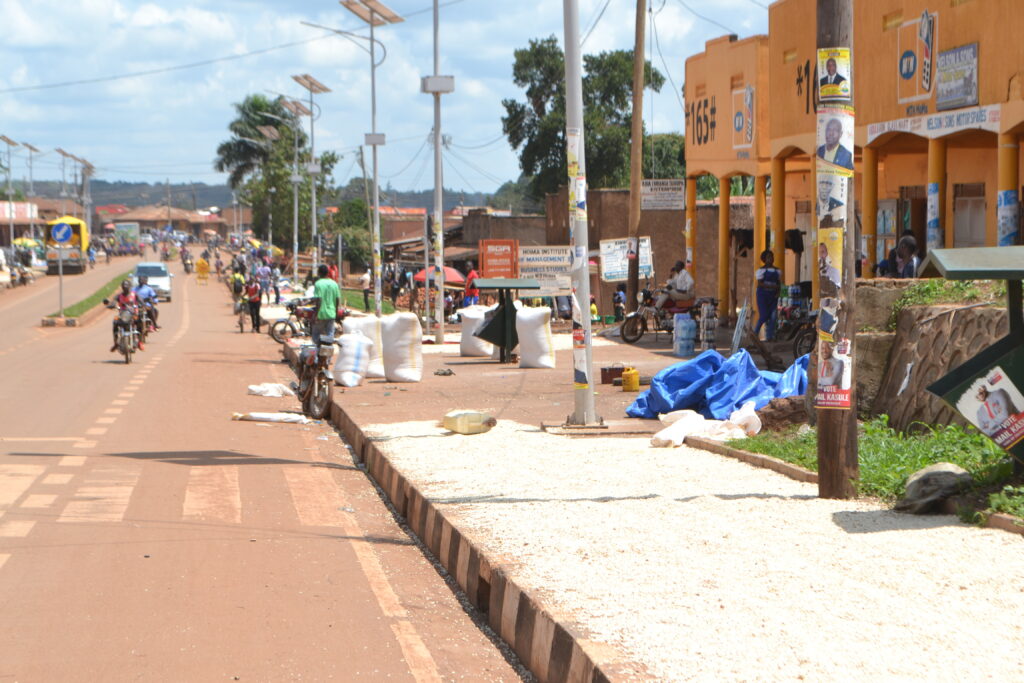
Produce dealers along a street in Hoima City have also turned the walkways as venues for drying maize and beans. Credit: Robert Atuhairwe/The Albertine Journal
“It is not just an inconvenience; it is a violation of our right to move freely. The city should be accessible to everyone.”
She wants the authorities to ensure there is law and order in the central business district by removing people from pavements to gazetted markets.
According to her, from 4:00pm onwards, authorities should stop selling on pavements and tell people to buy things from gazetted markets to avoid the gridlock in the town centre, which is prevalent during those times.
How it got to this state
In the 1990s Hoima, 225 kilometres northwest of Kampala and widely denominated as an “Oil City,” had close to one kilometre of paved roads.
The downtown commercial centre had tarmac only on main street going up to government road and past Post Office, then Kampala road up to Hoima Resort Hotel junction (then was called rest house).
Westwards from main street tarmac only stretched to adjacent Uganda Muslim Supreme Council Health Centre, northwards past Karuziika palace Duhaga Roundabout was the farthest tarmacked stretch.
Today, after the World Bank funding under Uganda Support to Municipal Infrastructure Development (USMID) project, starting in 2014, all downtown roads are tarmac, going right up to Our Lady of Lourdes Bujumbura Catholic Cathedral and Bishops house and Duhaga St. Peters Cathedral of the Anglican Church.
Even Perssey road that had proved a bane in the life of city residents was corrected under phase three of USMID. Kijungu roads to Isaka (Kitara Secondary) and Resident District Commission offices (past magistrates’ court) are fully tarmacked with pavements and drainage.
Some observers argue that the congestion of vendors on the sidewalks, is believed to have been drawn by the clean roads, under the alleged assumption that their items would remain clean and easily visible to potential buyers.
As a result, the pavements, once designated as safe spaces for pedestrians, have transformed into obstacle courses where every step is a negotiation with encroaching vendors, parked bodaboda riders, buildings, cars (sometimes), and motorcycle repairers, open-air roadside vendors, and dealing in cloth, foodstuffs, and shoes.
At some points there are turning trucks loading and offloading hardware and tarpaulin as drying pads for beans and maize summering in the sun on public pedestrian paths.
A first time visitor sees chaos that Hoima which was elevated to a City status in 2019 fiscal year, has degenerated into, blamed on incompetent institutions and half-hearted political will to sort out this mess before it gets too ugly.
The matter is exacerbated by a surge in population numbers as people flock the area in hordes to tap opportunities in the oil and gas sector.
The matter punctuated campaigns for the 2021 general elections. Mary Mugasa, the then City Mayor now state minister for public service had vowed to evict the said vendors to create orderliness in the Central Business District (CBD).
In a counterargument, Brian Kaboyo, the current Mayor insisted that the street vendors should be left to operate until a lasting solution is devised.
To make matters worse, on May 24, 2022 the over 200 vendors who used to operate in Kiddomole Market at Duhaga Roundabout were evicted after the landlord whose land council was renting for the market decided to use it for other purposes.
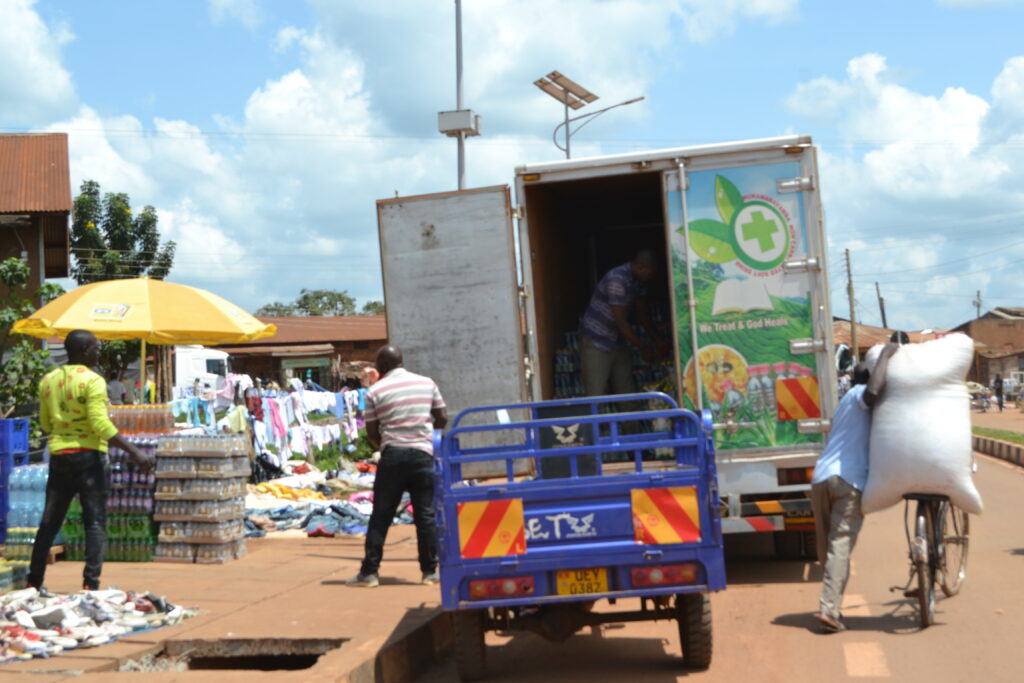
Traders offload goods along a pedestrian walkway on Kingdom road in Hoima City. Credit: Robert Atuhairwe/The Albertine Journal
The vendors all poured on the sidewalks. They are now popping up on pedestrian walkways along Kingdom road, Fort Portal road, Butiaba road and Perssey road.
Vending on pedestrian walkways in Hoima City is likened to the proverbial existence: as common as handshakes and tolerated on the streets as street kids.
This is also because the sh11b storied market is either out of range or is filled to capacity.
Some, decide to work from pathways running away from exorbitant rent which have increased tenfold over the last decade.
The frustrated voices echo through the streets, recounting tales of near misses, accessibility challenges, and the daily indignities faced by those on foot.
Law fails to bite?
Hoima City council in March 2022, approved an ordinance intended to ensure pedestrian safety and accessibility which has not been enforced todate.
The ordinance covers issues such as obstructing pedestrian pathways with parked vehicles or goods for sale, among others.
The ordinance prescribes a fine not exceeding two currency points (sh40,000) or imprisonment for a term not exceeding six months or both for anyone found guilty of breaching the regulations.
Stolen manhole covers
Manholes provide access to underground utility infrastructure such as sewage systems, water mains, and telecommunications cables.
However, amidst this melee one prominent issue is the stealing of the aforesaid manhole covers on pavements.
Others were damaged or improperly secured. By December last year, Hoima City Council was in need of sh30m to fix 50 manhole covers that were stolen from new roads.
The manhole covers had been stolen by alleged scrap dealers who abstract metals around them to magnify their profits.
At one time a public announcement was made stating that the trade in scrap was banned, and it is merely an enforcement gap.
But scrap trade is one of the most critical reactionary forces obstructing Uganda’s progress, to the extent of vandalising power pylons, electrical transformers and wires.
Gaping manholes on the pavements which are in every section of the town have proved to be perilous traps in the dark-giving way to injuries, accidents and compromises on pedestrian safety.
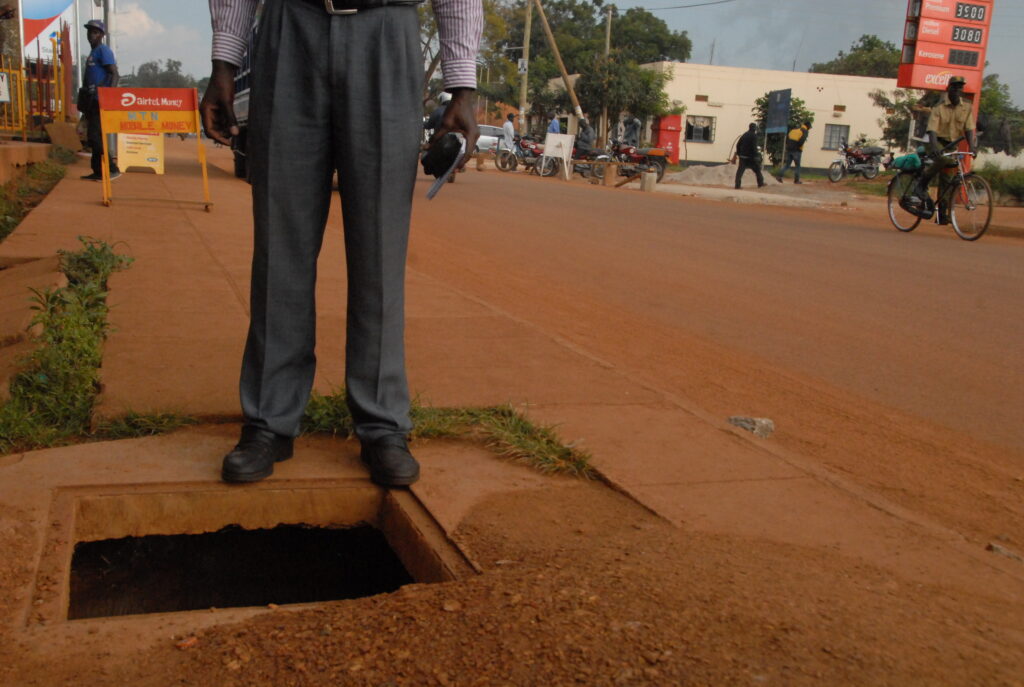
A man hole along Main Street in Hoima City which has remained uncovered for the last one year this puts lives of the pedestrians at risk. Credit: Robert Atuhairwe/The Albertine Journal
In December 2023, one city resident, John Talemwa, fell into a manhole along Bujumbura road and sustained injuries on the knee. He was treated and was told to buy a hinged knee brace at sh90,000.
Talemwa is not the only victim. Apprized media actor, commonly known as Apuuli BK of Spice FM fell victim with torn ligaments and fractures.
Atiku said parking on sidewalks undermines quality of life, and personal safety, and creates congestion, mayhem and personal discomfort..
He said excessive tonnage on sidewalks wears roads out ahead of their scheduled lifespan and that the aforesaid infrastructures are fated to be in tatters in a short time.
Stephen Wamukota, Hoima Branch Manager Uganda Red Cross Society which has recently been creating awareness on road safety in Hoima City, told The Albertine Journal last month that in a week they evacuated four accident victims to hospitals for treatment arising from congestion along pedestrian spaces.
He said people are over speeding on highways, adding that in the town they don’t over speed but have high cases of people who abuse traffic guidelines.
Kaboyo in a phone interview on how to balance development with public road safety, on February 16, explains that Hoima City has experienced rapid growth, and the infrastructure has struggled to keep up.
He admits that although there are regulations in place, enforcement is a challenge.
Section 24(1) of the Road Act, 2019, allows for the removal of an obstruction or encroachment on a public road or road reserve at the cost of the person responsible for the encroachment or obstruction, without prior notice.
“We need a multi-faceted approach to reclaim pedestrian space. This means we need to recruit more enforcers since we have only two who could not superintend over the entire city,” Kaboyo, added.
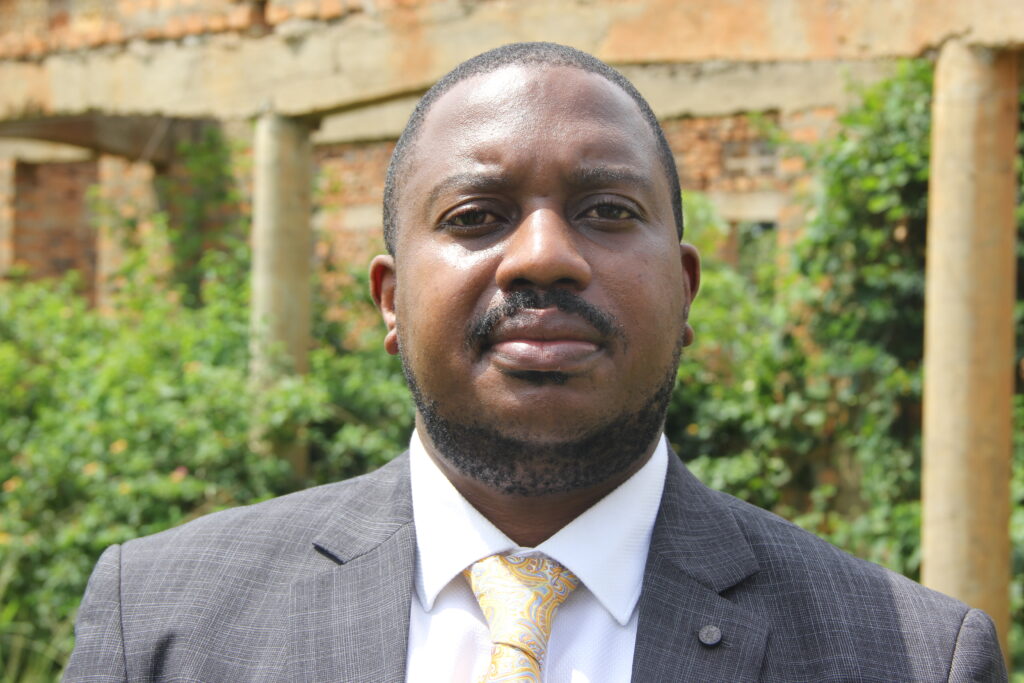
Hoima City Mayor, Brian Kaboyo. Credit: Robert Atuhairwe/The Albertine Journal
He highlights the need for stricter enforcement of existing regulations, collaborative efforts between the city council and business owners, and community engagement to raise awareness about the importance of pedestrian-friendly spaces.
Kaboyo said to secure more space for the vendors so that they get off the streets, they have written to the President to help finance purchase of the former Kiddomole market land and establish the second modern market.
Wamukota, stresses the need for a cultural shift. “We need to change the perception that the sidewalks are fair game for anyone. They are public spaces meant for everyone, and safety should be prioritised.”
Traffic police have been seen on rare occasions doing enforcement only when a public officer including the President and Prime Minister is to use the city roads or in case there is a big event.
Julius Allan Hakiza, the Albertine region police publicist told The Albertine Journal on Monday that their duty is to just implement resolutions of council.
“Traffic police wait for the city council to come and request for their services. If they don’t come there is no way we can interfere and that issue of street vending is for the city authorities to deal with,” he said.

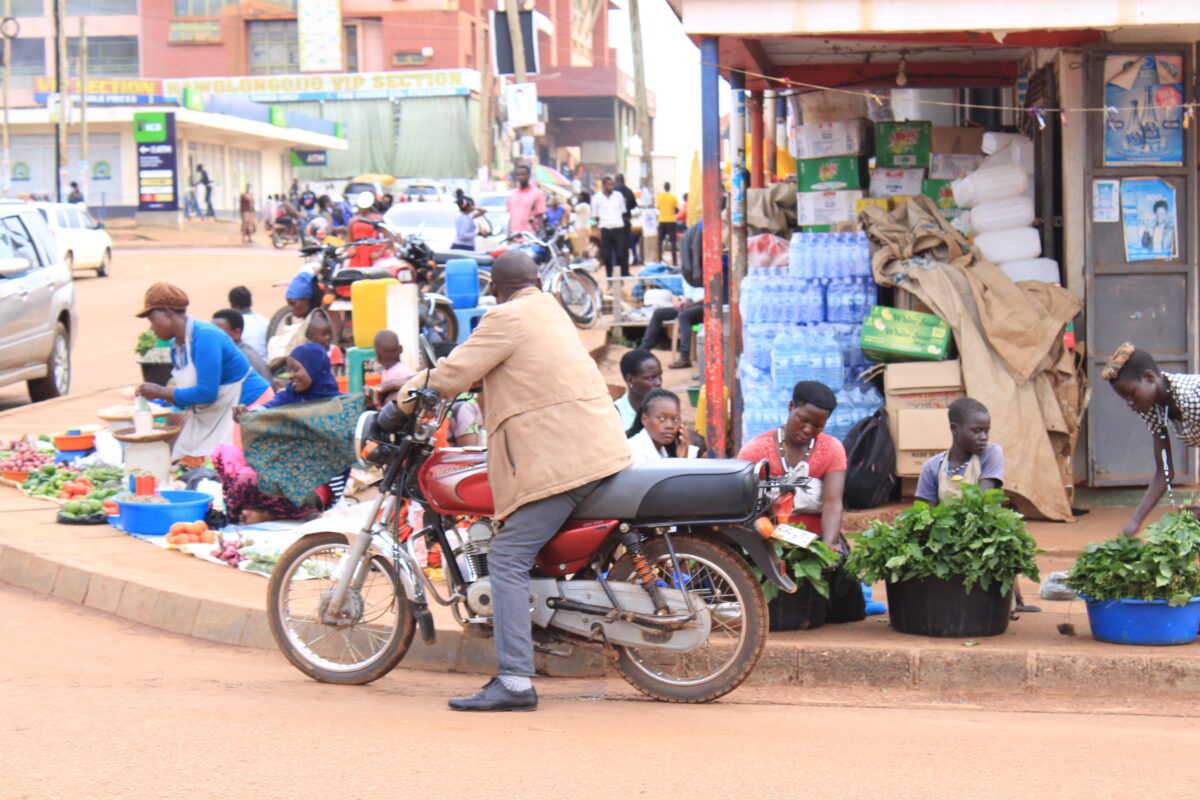
Its True, And The Authority In The Oil City Seem To Be Benefiting Because It Has Taken Long. One Would Think Its The Responsibility Of The City Authority To Keep Hoima City Clean As We Used To Sing “Keep Hoima City Clean” What Went Wrong To The Singing of Our Oil City Clean.
It’s unfortunate that all these anomalies are happening in the city when we have the leadership in place. One wonders whether the city council benefits more revenue from scrap dealers than the negative effects of vandalism in the city and all district due to scrap dealing. There is rampant vandalism of chain links and angle bars from the entire city selling them to scrap dealers. There is a racket from scrap dealers with orders to steal chain links and immediately they are delivered their immediate buys collect them.i recently lost over 150feet of my chain link and angle line to these thefts. Scrap dealers cut these chain links into kilograms which are sold to gas and welding dealers. The police would position it’s cameras at all scrap deal centers to observe all incoming and outgoing scrap businesses front suspecting thieves. These scrap dealers should be enforced to install security cameras by the police and city council to monitor and cross check all incoming and outgoing going scrap deals if at all these thefts or thieves are to be arrested. The city council should make by laws to control scrap business in the city. Third parties should not be allowed to deliver scrap to the scrap centers. The only authorised scrap dealers should move around homes like the city council trucks reaching out to those households who want to sell their scrap and children and youth roaming around every home without authority should be arrested and charged in the courts of law.
All said is right. But one critical correction that should be made is that Cars don’t park where pedestrians are supposed park. Actually, in town, *Walk ways* are at the pavement. It’s the vendors who blocked the walkways not cars. There is need to put politics a side, and we reorganize the city again. In some parts, Motorcycle repairers came back and also blocked the walkways. For example on that street along Sax pub.
So city authority, put politics a side and reorganize the City.